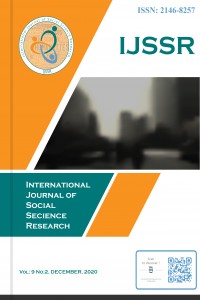Öz
Bir ekonomideki gelecek beklentileri, ekonomi politikalarının seyrini etkileyen en önemli faktörlerden biridir. Tüketicilerin beklentileri birçok makroekonomik değişkeni önemli ölçüde etkileyebilmektedir. Bu çalışmanın temel amacı, 2012: 01-2019: 09 dönemini kapsayan aylık verileri kullanarak döviz kuru ile tüketici güveni arasındaki ilişkiyi araştırmaktır. Pesaran vd. (2001) tarafından geliştirilen Gecikmesi Dağıtılmış Otogresif Model yöntemi uygulanmıştır. Bu analiz yönteminin en önemli avantajı, modeldeki değişkenler farklı durağanlık seviyelerine sahip olsalar dahi, ARDL sınır testinin uygulanabiliyor olmasıdır. Elde edilen analiz sonuçlarına göre, döviz kuru ile tüketici güveni arasında anlamlı bir ilişki bulunmaktadır. Ayrıca döviz kuru hem uzun hem de kısa vadede tüketici güvenini olumsuz etkilemektedir.
Anahtar Kelimeler
Kaynakça
- Çelik, S. (2010). An Unconventional Analysis of Consumer Confidence Index for the Turkish Economy. International Journal of Economics and Finance Studies, 2: (1), 121-129.
- Delorme, Jr., C. D., Kamerschen D. R. and Voeks L. F. (2001). Consumer Confidence and Rational Expectations in the United States Compared with the United Kingdom. Applied Economics 33: (7), 863-869.
- Gürgür, T. and Kılınç, Z. (2015). In Search of the Drivers of the Turkish Consumer Confidence. CBRT Working Paper, 15: (38), Ankara.
- Golinelli, R. and Parigi, G. (2004). Consumer Sentiment and Economic Activity: A Cross Country Comparison. Journal of Business Cycle Measurement and Analysis, 1: (2), 147-170.
- Karasoy, H. G. (2015). Consumer Confidence Indices and Financial Volatility. Research Notes in Economics, Central Bank of the Republic of Turkey, 15: (16).
- Narayan S., and Narayan P.K. (2004). Determinants of Demand of Fiji’s Exports: An Empirical Investigation. The Developing Economics, 17: (1), 95-112.
- Katona, G. (1968). Consumer Behavior: Theory and Findings on Expectations and Aspirations. The American Economic Review, 58: (2), 19-30.
- Ludvigson, S. (2004). Consumer Confidence and Confidence Spending. Journal of Economic Perspectives, 18: (2), 29-50.
- McIntyre, K. H. (2007). Reconciling Consumer Confidence and Permanent Income Consumption. Eastern Economic Journal 33: (2), 257-275.
- Oral, E. (2005). Consumer Confidence Index for Turkey. OECD Workshop on International Development of Business and Consumer Tendency Surveys, Brussels, Belgium.
- Pesaran, M. H., Shin, Y. and Smith, R. J. (2001). Bounds Testing Approaches to the Analysis of Level Relationships. Journal of Applied Econometrics, 16: (3), 289-326
Ayrıntılar
| Birincil Dil | Türkçe |
|---|---|
| Bölüm | Araştırma Makalesi |
| Yazarlar | |
| Yayımlanma Tarihi | 31 Aralık 2020 |
| Kabul Tarihi | 24 Aralık 2020 |
| Yayımlandığı Sayı | Yıl 2020 Cilt: 9 Sayı: 2 |
Kaynak Göster
*


